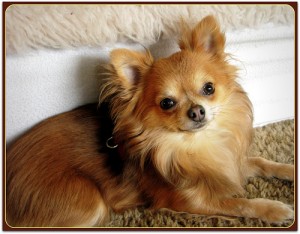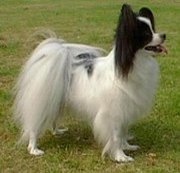Chihuahuas
February 17, 2010 by LaBecs
Filed under Chihuahuas
1.- There are two kinds of Chihuahuas: Apple head, with a short nose and round head, and Deer head, with a more elongated face.
 2.- They come long haired or short haired. The short haired has a smooth coat and sheds minimally. The long haired Chihuahua’s coat is silky, curly or flat.
2.- They come long haired or short haired. The short haired has a smooth coat and sheds minimally. The long haired Chihuahua’s coat is silky, curly or flat.
3.- They come in many colors: sand, black, fawn, white, black and white… and more.
4.- They are the tiniest dog breed.
5.- They do better with solid, dry food. Soft and canned food can promote dental problems.
6.- They are highly intelligent and can be hard to train. They require firm and gentle leadership.
7.- They gain weight easily, which can be very harmful to their health.
8.- They look very active at home, but that should not take the place of a good walk. When they are not walked often, they can present behavior problems.
9.- They can live from 14 to 19 years.
10.- They like to form ‘”clans” and will get along better with other Chihuahuas than other breeds.
They need to be very well socialized. If you allow them to be the pack leader, they’ll become possessive and even aggressive towards strangers. They can also be aggressive towards other dogs.
Though they are cute and tiny, they are not recommended for children.
Their temperament depends totally on how the owners treat them. If the owners are overly protective and baby them too much (which is the tendency) they will not be trustworthy pets. They can even become obnoxious.
Shelters tend to have large amounts of Chihuahuas. People tend to abandon them when they realize they are not the “toys” they hoped they would be. They represent a big responsibility.
Yes, their name comes from the Mexican State of Chihuahua, where they were discovered, but they date as far back as the 9th century AD and were found in the Aztec capital.
Long Haired Chihuahua Photo Courtesy of: Phoenix wolf-ray
Apple Head Chihuahua courtesy of: blackdood
Top 12 Friendliest Dogs
April 24, 2009 by LaBecs
Filed under Friendliest Dogs
When you decide to bring a new dog into your life, it helps to know its temperament, what’s the breed’s normal behavior, what are its characteristics, etc. Some dogs are great for kids, when some others are better suited for athletic grown ups, and yet others are better with elderly people. But, which breeds make the friendliest dogs? Some breeds are friendlier by nature than others, that’s not to say that a dog’s temperament cannot be greatly dependent on the owner’s behavior and lifestyle. It also doesn’t mean that if the breed tends to be friendly, it’s automatically an appropriate breed for all people. To help you do your homework, here’s a list of the top 12 friendliest dogs around.
Click on the pictures to learn more!
 #12 #12Brittany Spaniel |
 #11 #11Japanese Chin |
||||||||
 #10 #10Vizla |
 #9 #9Springer Spaniel |
||||||||
 #8 #8Cavalier King Charles |
 #7 #7Papillon |
||||||||
|
|||||||||
CLICK HERE TO SEE THE FRIENDLIEST CATS…
Photo credits:
Control Your Dog’s Excited Urination
March 20, 2009 by LaBecs
Filed under Control Your Dog's Excited Urination
Who has not come across a dog that pees on cue as soon as you approach him or her to greet them? This is what is called submissive or excited urination
What is submissive or excited urination and why does it happen?
A submissive urinator is a dog that cannot help urinating in situations of extreme excitement or stress – he’ll go on the floor, on himself on you, on your furniture or on your guests!
Puppies are a perfect example of submissive urinators. They’ll pee whenever they’re excited to see you or when they meet a stranger. But sometimes very timid or sensitive adult dogs can have the problem too. It’s very typical of a dog that has been abused to exhibit this behavior.
This problem can happen in many situations:
-When they meet you after a prolonged absence
-When they’re playing
-When your guests arrive
-When there’s a stressful situation at home
-When you scold him or correct him
-Loud noises like a thunderstorm or fireworks
But don’t despair. It is really not difficult to fix this problem of submissive/excited urination.
First of all, take him to the veterinarian to make sure there’s no medical reason for the issue. Diabetes or a bladder infection can have the same effect.
Then you can follow some simple steps:
-Limit his intake of water. This doesn’t mean that you should restrict his water intake, but if, for example, you are expecting guests, or you will soon have a play session, take his water bowl away for a little while before the event happens.
-Don’t make your coming home a big event. When you come in the door, ignore him, go about your business and don’t get him worked up. The more excited he is, the harder it will be for him to control his bladder. I know I have a hard time not saying a warm hello to my baby, but you can always ignore him for the first few seconds and then crouch down and greet him calmly.
-Keep in mind the importance of NOT punishing or yelling at your dog when he has his “accident”. Remember he cannot control it and above all, he’s not doing it on purpose. When you catch him in the act, interrupt him with a firm “No!”, and praise him when he stops, but never punish him. Keep calm and be understanding: he doesn’t mean to do it.
-When he urinates out of fear (submissiveness) when you are scolding him for another reason, try to maintain an authoritative and firm tone, but don’t get angry. Keep in mind that in all probability, you are dealing with a sensitive, highly-strung dog, so, if you get angry or worry him further, the problem will definitely get worse.
-When the problem happens with loud noises like fireworks, if you show a reaction yourself and pet him for being scared, you will only be rewarding the behavior and training him to repeat it, and you don’t want that. You can try and make it a game. When you hear a loud bang, say, “what was that!” Make it a search game and give him a treat or a toy. You can also make no reaction whatsoever, or fuss or comfort him. Give him the down and stay commands, give him a treat and tell him he’s a good boy.
Always remember that when you have a dog, you must treat him with respect and understanding. Almost every “problem” has a solution, and with a little patience, you can do it without the need of expensive training. A few hours working on a problem, can give you many years of enjoyment with your best friend.



 #6
#6 #5
#5

 #2
#2 #1
#1